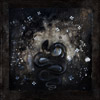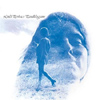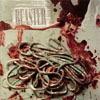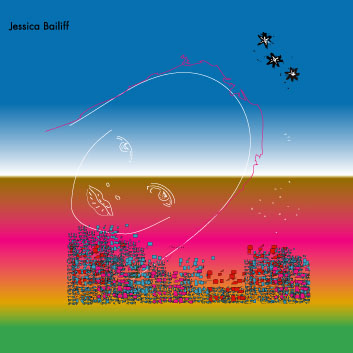 For his installment in the Utech URSK series, Justin Broadrick's earliest project channels some of his older dark ambient work under that moniker, but also brings up some of his earliest days of harsh noise and power electronics as well, making for some of the rawest Final work that he’s released yet.
For his installment in the Utech URSK series, Justin Broadrick's earliest project channels some of his older dark ambient work under that moniker, but also brings up some of his earliest days of harsh noise and power electronics as well, making for some of the rawest Final work that he’s released yet.
Two new shows just for you. We have squeezed out two extended release episodes for this weekend to get you through this week. They contain mostly new songs but there's also new issues from the vaults. The first show features music from Rider/Horse, Mint Field, Robert Aiki Aubrey Lowe, Anastasia Coope, ISAN, Stone Music, La Securite, Bark Psychosis, Jon Rose, Master Wilburn Burchette, Umberto, Wand, Tim Koh, Sun An, and Memory Drawings. The second episode has music by Laibach, Melt-Banana, Chuck Johnson, X, K. Yoshimatsu, Dorothy Carter, Pavel Milyakov, Violence Gratuite, Mark Templeton, Dummy, Endon, body / negative, Midwife, Alberto Boccardi, Divine. Cow in Maui from Veronika in Vienna. Get involved: subscribe, review, rate, share with your friends, send images! |



 Since childhood Perhacs has composed music using elements from her visualization of sound (color frequencies, musical shapes, etc,...). This cult album from 1970 combines ethereal folk with flourishes of electronics and spacey jazz. Eight bonus tracks, fascinating notes, and sketches make this a worthwhile reissue.
Since childhood Perhacs has composed music using elements from her visualization of sound (color frequencies, musical shapes, etc,...). This cult album from 1970 combines ethereal folk with flourishes of electronics and spacey jazz. Eight bonus tracks, fascinating notes, and sketches make this a worthwhile reissue. Much to the chagrin of bloated record labels and those authoritarian grumps at the RIAA, young people today have near instantaneous and essentially free access to virtually any song thanks to the proliferation of torrents and other file sharing schemes. That brazen attitude inevitably had to expand to music composition, though, as this album proves, that might not be entirely for the best.
Much to the chagrin of bloated record labels and those authoritarian grumps at the RIAA, young people today have near instantaneous and essentially free access to virtually any song thanks to the proliferation of torrents and other file sharing schemes. That brazen attitude inevitably had to expand to music composition, though, as this album proves, that might not be entirely for the best. When this EP first came out it made little sense to me. The six songs were recorded during the same session as Copper Blue but the sound was completely different. The sound was rather grim, there were no happy singalongs, the vocals were buried (if present at all), and I didn't quite understand if it was attempting to be religious statement or not. Nineteen years later, a cleaned up master and back story makes a world of distance as it almost completely makes sense now.
When this EP first came out it made little sense to me. The six songs were recorded during the same session as Copper Blue but the sound was completely different. The sound was rather grim, there were no happy singalongs, the vocals were buried (if present at all), and I didn't quite understand if it was attempting to be religious statement or not. Nineteen years later, a cleaned up master and back story makes a world of distance as it almost completely makes sense now. This long unavailable album marks an important step in the development of Drew Daniel and MC Schmidt's music in that it is the first themed album of many in their career, which is one of the defining features that makes Matmos so interesting. Anyone can try and be clever with quirky samples but with The West, Matmos rose above using novelty sounds just for the sake of them. At this point they became an intellectually challenging but still musically compelling entity.
This long unavailable album marks an important step in the development of Drew Daniel and MC Schmidt's music in that it is the first themed album of many in their career, which is one of the defining features that makes Matmos so interesting. Anyone can try and be clever with quirky samples but with The West, Matmos rose above using novelty sounds just for the sake of them. At this point they became an intellectually challenging but still musically compelling entity. All functional humans have the capacity to make noise, whether it'swith what genetics gave them or the tools they make. However, very fewhave the capabilities of making noisy things sound amazing to the humanear. Some bands never achieve this. Thankfully, at least Jackie-OMotherfucker does a good job of achieving it about half the time oneach their albums. In all of my recordings of this Portland,Oregon-based collective, they have remained consistent between thenumber of songs that sound completely derivative and uninspiring tosongs that really sound like an impressively orchestrated group ofmusicians whose sounds amount to more than just chin-scratching mayhem.For the latest disc, the band opens with a track that doesn't move faroff the Molasses-like northern white guy hillbilly blues singing tipand follows it up with a track that kept me re-referring to the packageto make sure it wasn't an elaborate cover of Jandek's "Carnival Queen"with tape mutilations. It's at this point, however, that the ensembleis basically getting in gear. They pause for a 17-second instruction onplaying on "the seven" and by halftime through the immense (andperpetually changing) fourth track, "777 (Tombstone Massive)," I'mhappily lost in a daze. It opens with relentless drum and percussionpoundings then halts, restarting with a crackle, wind instruments,chimes and a low string drone. A quick rise reintroduces the forcefulpercussion from the first few moments but thankfully that dies down forthe mesmerising interplay between strings, winds, and chimes. Just wheneverything boils up to a clumsy, disorganized borderline masturbatoryjam with nobody paying attention to each other, (the end of "Feast ofthe Mau Ma") quietness befalls the record and all is good again. Thealbum ends with two more 10-minute pieces: a blissful quietinstrumental and a 'manual' loop of guitar and drums with distortedvocals which leaves me with an unsettling feeling despite theviolinists struggles to play something pleasant. One of these days thisband is either going to make a record that will be my favorite of theyear or send a pipe bomb to my P.O. box. I don't know which to fearmore.
All functional humans have the capacity to make noise, whether it'swith what genetics gave them or the tools they make. However, very fewhave the capabilities of making noisy things sound amazing to the humanear. Some bands never achieve this. Thankfully, at least Jackie-OMotherfucker does a good job of achieving it about half the time oneach their albums. In all of my recordings of this Portland,Oregon-based collective, they have remained consistent between thenumber of songs that sound completely derivative and uninspiring tosongs that really sound like an impressively orchestrated group ofmusicians whose sounds amount to more than just chin-scratching mayhem.For the latest disc, the band opens with a track that doesn't move faroff the Molasses-like northern white guy hillbilly blues singing tipand follows it up with a track that kept me re-referring to the packageto make sure it wasn't an elaborate cover of Jandek's "Carnival Queen"with tape mutilations. It's at this point, however, that the ensembleis basically getting in gear. They pause for a 17-second instruction onplaying on "the seven" and by halftime through the immense (andperpetually changing) fourth track, "777 (Tombstone Massive)," I'mhappily lost in a daze. It opens with relentless drum and percussionpoundings then halts, restarting with a crackle, wind instruments,chimes and a low string drone. A quick rise reintroduces the forcefulpercussion from the first few moments but thankfully that dies down forthe mesmerising interplay between strings, winds, and chimes. Just wheneverything boils up to a clumsy, disorganized borderline masturbatoryjam with nobody paying attention to each other, (the end of "Feast ofthe Mau Ma") quietness befalls the record and all is good again. Thealbum ends with two more 10-minute pieces: a blissful quietinstrumental and a 'manual' loop of guitar and drums with distortedvocals which leaves me with an unsettling feeling despite theviolinists struggles to play something pleasant. One of these days thisband is either going to make a record that will be my favorite of theyear or send a pipe bomb to my P.O. box. I don't know which to fearmore. This compilation of artists on SharkAttack! features some extremely talented bands playing some incredibly strong material. Charlene, whose members started SharkAttack!, contribute four tracks, HelloAttack give two, and Compass and Lockgroove three each.
This compilation of artists on SharkAttack! features some extremely talented bands playing some incredibly strong material. Charlene, whose members started SharkAttack!, contribute four tracks, HelloAttack give two, and Compass and Lockgroove three each. After two impressive albums recorded with Alan and Mimi of Low, Jessicacomes home with her third album —recorded at home with Jesse Edwards,her bandmate in Red Morning Chorus and Northern Song Dynasty. Therecord has a much more intimate feel than any she's recorded, with aneye towards more acoustic arrangements and a bit more experimentation.Everything sounds sparse or barren, far more than other releases have,like there's a stark loneliness or quiet that is being explored on eachtrack. Often times it all sounds brittle, even, as it feels like ifthese songs are pushed like she has in the past, emitting any noisethat is too harsh, it will all come crashing down. Bailiff's voice isas assured and sultry as ever, and the treatments on a few tracks evenelevate it, making it sound firmly otherworldly. All these ingredientsmake for her most engaging release yet. "Swallowed" is classic Bailiff:steady rhythm with small flourishes and the desperate call of "If onlyyou'd hold me and say it's all right." "Hour of the Traces," with theviolin-uke melody and percussion that sounds like taps on an acousticguitar, is hauntingly pure and pained, even as a happy tin whistle,faded in the mix, plays along. Finally, on "Disappear," the roar comesin and the volume increases and the guitar distorts seemingly intooblivion with computer voice back-up to hold it all in. The albumcloses with the piano-based "The Thief," a lamenting chorus of voicessinging behind Bailiff as the song progresses. It's a gorgeous moment,where I felt Bailiff stepping out of herself.
After two impressive albums recorded with Alan and Mimi of Low, Jessicacomes home with her third album —recorded at home with Jesse Edwards,her bandmate in Red Morning Chorus and Northern Song Dynasty. Therecord has a much more intimate feel than any she's recorded, with aneye towards more acoustic arrangements and a bit more experimentation.Everything sounds sparse or barren, far more than other releases have,like there's a stark loneliness or quiet that is being explored on eachtrack. Often times it all sounds brittle, even, as it feels like ifthese songs are pushed like she has in the past, emitting any noisethat is too harsh, it will all come crashing down. Bailiff's voice isas assured and sultry as ever, and the treatments on a few tracks evenelevate it, making it sound firmly otherworldly. All these ingredientsmake for her most engaging release yet. "Swallowed" is classic Bailiff:steady rhythm with small flourishes and the desperate call of "If onlyyou'd hold me and say it's all right." "Hour of the Traces," with theviolin-uke melody and percussion that sounds like taps on an acousticguitar, is hauntingly pure and pained, even as a happy tin whistle,faded in the mix, plays along. Finally, on "Disappear," the roar comesin and the volume increases and the guitar distorts seemingly intooblivion with computer voice back-up to hold it all in. The albumcloses with the piano-based "The Thief," a lamenting chorus of voicessinging behind Bailiff as the song progresses. It's a gorgeous moment,where I felt Bailiff stepping out of herself. 'Style Drift' couldn't be a more appropriate title for this,Fontanelle's long-awaited sophomore full-length, as the band don'tnecessarily shift their style but improve enough to make a noticeabledifference. Recorded again in their Magnetic Park studio, 'Drift' is areal step forward for the band, as their confidence improves and theirarrangements gain strength and weight. For improvisation-based music,it doesn't get any better than this, and Fontanelle are reaching anapex where their version will be instantly recognizable. As always, thedrumming is tight, the bass a propulsive mass, and the wah-wah guitartasty. The keys, different types, are more ingrained than before, andcreate a mood and feel all by themselves, often with layered effectsand computer gimmicry applied to them. The band has become tighter, asperfectly evidenced on the breaks in the title track. There's adefinite jazz vocabulary at work, too, that only serves to improve theproceedings. Overall, though, the spirit in Fontanelle is inmaniupulation. There are sounds on this record that are new for theband, as they reach out towards the outer limits. Imagine, if you will,that the Max Rebo Band fired Sy Snoodles and got a hold of a fewTortoise records and you wouldn't be far off. Fontanelle have alwaysbeen amazing musicians, but on this release they are in the pocketevery time, working together better than ever, and proving that thereis longevity and consistency in doing it all off the cuff.
'Style Drift' couldn't be a more appropriate title for this,Fontanelle's long-awaited sophomore full-length, as the band don'tnecessarily shift their style but improve enough to make a noticeabledifference. Recorded again in their Magnetic Park studio, 'Drift' is areal step forward for the band, as their confidence improves and theirarrangements gain strength and weight. For improvisation-based music,it doesn't get any better than this, and Fontanelle are reaching anapex where their version will be instantly recognizable. As always, thedrumming is tight, the bass a propulsive mass, and the wah-wah guitartasty. The keys, different types, are more ingrained than before, andcreate a mood and feel all by themselves, often with layered effectsand computer gimmicry applied to them. The band has become tighter, asperfectly evidenced on the breaks in the title track. There's adefinite jazz vocabulary at work, too, that only serves to improve theproceedings. Overall, though, the spirit in Fontanelle is inmaniupulation. There are sounds on this record that are new for theband, as they reach out towards the outer limits. Imagine, if you will,that the Max Rebo Band fired Sy Snoodles and got a hold of a fewTortoise records and you wouldn't be far off. Fontanelle have alwaysbeen amazing musicians, but on this release they are in the pocketevery time, working together better than ever, and proving that thereis longevity and consistency in doing it all off the cuff. Add N to (X) have a fantastic formula. Catchy post-punk hooks played onprimal synths coupled with a powerful drummer works well in dirty andloud live settings. The band puts on some of the best shows I've hadthe privilige to see over the last couple years. Their biggestchallenge at this point is to take some of that raw live energy andchannel it into their recordings so there's less wishy-washy tunes thatsimply meander all over the place. Like all of their records, there aresome really awesome moments here. I'm partial to the Meat Beat-ishsampled drum shuffle on "Elecrtic Village," the new wave of snottypost-punk vocals of "Large Number," and the campiness of the album'sopener, "Total All Out Water." There are numerous low points, however.The "I Hate Her/She Hate Me" vocals on "Sheez Mine" and spoken word on"Invasion of the Polaroid People," sound completely convictionless andcould have easily been omitted from the album altogether. Theundeniable hit, "Quantum Loop," has a strong enough hook to carry thetune but the random scattering of samples seems like a poorly plannedafterthought. Even the album's single, "Take Me To Your Leader," kindof fizzles after only a minute or so. While I'm not looking for them torecreate some of my fave tunes from the last five years, ("MetalFingers in My Body," or "Plug Me In" still get me as excited as thefirst time I heard them) there is an increasing lack of strong tunesand completed thoughts this time around.
Add N to (X) have a fantastic formula. Catchy post-punk hooks played onprimal synths coupled with a powerful drummer works well in dirty andloud live settings. The band puts on some of the best shows I've hadthe privilige to see over the last couple years. Their biggestchallenge at this point is to take some of that raw live energy andchannel it into their recordings so there's less wishy-washy tunes thatsimply meander all over the place. Like all of their records, there aresome really awesome moments here. I'm partial to the Meat Beat-ishsampled drum shuffle on "Elecrtic Village," the new wave of snottypost-punk vocals of "Large Number," and the campiness of the album'sopener, "Total All Out Water." There are numerous low points, however.The "I Hate Her/She Hate Me" vocals on "Sheez Mine" and spoken word on"Invasion of the Polaroid People," sound completely convictionless andcould have easily been omitted from the album altogether. Theundeniable hit, "Quantum Loop," has a strong enough hook to carry thetune but the random scattering of samples seems like a poorly plannedafterthought. Even the album's single, "Take Me To Your Leader," kindof fizzles after only a minute or so. While I'm not looking for them torecreate some of my fave tunes from the last five years, ("MetalFingers in My Body," or "Plug Me In" still get me as excited as thefirst time I heard them) there is an increasing lack of strong tunesand completed thoughts this time around.
